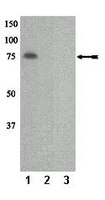BART inhibits pancreatic cancer cell invasion by PKCα inactivation through binding to ANX7.
Taniuchi, K; Yokotani, K; Saibara, T
PLoS One
7
e35674
2012
Show Abstract
A novel function for the binder of Arl two (BART) molecule in pancreatic cancer cells is reported. BART inhibits invasiveness of pancreatic cancer cells through binding to a Ca(2+)-dependent, phosphorylated, guanosine triphosphatase (GTPase) membrane fusion protein, annexin7 (ANX7). A tumor suppressor function for ANX7 was previously reported based on its prognostic role in human cancers and the cancer-prone mouse phenotype ANX7(+/-). Further investigation demonstrated that the BART-ANX7 complex is transported toward cell protrusions in migrating cells when BART supports the binding of ANX7 to the protein kinase C (PKC) isoform PKCα. Recent evidence has suggested that phosphorylation of ANX7 by PKC significantly potentiates ANX7-induced fusion of phospholipid vesicles; however, the current data suggest that the BART-ANX7 complex reduces PKCα activity. Knocking down endogenous BART and ANX7 increases activity of PKCα, and specific inhibitors of PKCα significantly abrogate invasiveness induced by BART and ANX7 knockdown. These results imply that BART contributes to regulating PKCα activity through binding to ANX7, thereby affecting the invasiveness of pancreatic cancer cells. Thus, it is possible that BART and ANX7 can distinctly regulate the downstream signaling of PKCα that is potentially relevant to cell invasion by acting as anti-invasive molecules. | 22532868
 |








